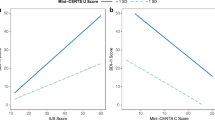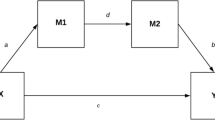Abstract
A series of four studies used different measures to assess the amount of attributional processing following failure and success. It was found that, from an actor's point of view, relatively depressed students consistently differed from relatively nondepressed students in the amount of their attributional processing. The depressed individuals reported more attributions for both hypothetical and real failure, compared to the nondepressed individuals. They also reported fewer attributions for hypothetical success than the nondepressed individuals. In line with previous findings, depressed individuals took less personal credit for their successes and ascribed their failures more pronouncedly to their lack of ability. The findings reflect a depressive attributional processing style that encompasses individual differences, both in the content and in the amount of causal thinking following failure and success. Integration of this style into the attributional helplessness model of depression is suggested. The findings are compatible with a differential self-esteem view of depression and with aspects of Kuhl's functional helplessness model of depression. Implications for depression therapy are briefly discussed.
Similar content being viewed by others
References
Abramson, L. Y., Garber, J., & Seligman, M. E. P. (1980). Learned helplessness in humans: An attributional analysis. In J. Garber & M. E. P. Seligman (Eds.),Human helplessness: Theory and applications. New York: Academic Press.
Abramson, L. Y., Seligman, M. E. P., & Teasdale, J. D. (1978). Learned helplessness in humans: Critique and reformulation.Journal of Abnormal Psychology, 87 49–74.
Beck, A. T. (1967).Depression: Clinical, experimental, and theoretical aspects. New York: Harper & Row.
Beck, A. T., Ward, C. H., Mendelson, M., Mock, J., & Erbaugh, J. (1961). An inventory for measuring depression.Archives of General Psychiatry, 4 561–571.
Bibring, E. (1953). The mechanism of depression. In P. Greenacre (Ed.),Affective disorders. New York: International Universities Press.
Bower, G. H. (1981). Mood and memory.American Psychologist, 36 129–148.
Bumberry, W., Oliver, J. M., & McClure, J. N. (1978). Validation of the Beck Depression Inventory in a university population using psychiatric estimate as the criterion.Journal of Consulting and Clinical Psychology, 46 150–155.
Fenigstein, A., Scheier, M. F., & Buss, A. H. (1975). Public and private self-consciousness: Assessment and theory.Journal of Consulting and Clinical Psychology, 43 522–527.
Freud, S. (1957). Mourning and melancholia. In J. Strachey (Ed. and Trans.),The complete psychological works of Sigmund Freud (Vol. 14). London: Hogarth Press. (Original work published 1917)
Gotlib, I. H. (1983). Perception and recall of interpersonal feedback: Negative bias in depression.Cognitive Therapy and Research, 7 399–412.
Heckhausen, H. (1980, June).Attributional analysis of achievement motivation: Some unresolved problems. Paper presented at the Conference on Attributional Approaches to Human Motivation, Bielefeld (Federal Republic of Germany).
Heinemann, W. (1979). The assessment of private and public self-consciousness: A German replication.European Journal of Social Psychology, 9 331–337.
Kammer, D. (1983a). Depression, attributional style, and failure generalization.Cognitive Therapy and Research, 7 413–424.
Kammer, D. (1983b). Eine Untersuchung der psychometrischen Eigenschaften des deutschen Beck-Depressionsinventars (BDI).Diagnostica, 2 48–60.
Kuhl, J. (1981). Motivational and functional helplessness: The moderating effect of state versus action orientation.Journal of Personality and Social Psychology, 40 155–170.
Kuhl, J. (1984). Volitional aspects of achievement motivation and learned helplessness: Toward a comprehensive theory of action control. In B. A. Maher (Ed.),Progress in experimental personality research (Vol. 13). New York: Academic Press.
Levine, M. (1966). Hypothesis behavior by humans during discrimination learning.Journal of Experimental Psychology, 71 331–338.
Lewinsohn, P. M., Lobitz, W. C., & Wilson, S. (1973). “Sensitivity” of depressed individuals to aversive stimuli.Journal of Abnormal Psychology, 81 259–263.
Lishman, W. A. (1972). Selective factors in memory. Part 2: Affective disorder.Psychological Medicine, 2 248–253.
Lloyd, G. G., & Lishman, W. A. (1975). Effect of depression on the speed of recall of pleasant and unpleasant experiences.Psychological Medicine, 5 173–180.
Nelson, R. E., & Craighead, W. E. (1977). Selecive recall of positive and negative feedback, self-control behaviors, and depression.Journal of Abnormal Psychology, 86 379–388.
Peterson, C., & Seligman, M. E. P. (1984). Causal explanations as a risk factor for depression: Theory and evidence.Psychological Review, 91 347–374.
Pyszczynski, T. A., & Greenberg, J. (1981). Role of disconfirmed expectancies in the instigation of attributional processing.Journal of Personality and Social Psychology, 40 31–38.
Rehm, L. P. (1977). A self-control model of depression.Behavior Therapy, 8 787–804.
Scheier, M. F., Buss, A. H., & Buss, D. M. (1978). Self-consciousness, self-report of aggressiveness, and aggression.Journal of Research in Personality, 12 133–140.
Seligman, M. E. P. (1981). A learned helplessness point of view. In L. P. Rehm (Ed.),Behavior therapy for depression: Present status and future directions (pp. 123–141). New York: Academic Press.
Taoachnik, N., Crocker, J., & Alloy, L. B. (1983). Depression, social comparison, and the false-consensus effect.Journal of Personality and Social Psychology, 45 688–699.
Wong, P. T. P., & Weiner, B. (1981). When people ask “why” questions, and the heuristics of attributional search.Journal of Personality and Social Psychology, 40 650–663.
Author information
Authors and Affiliations
Additional information
Financial support for the studies was obtained from the University of Bielefeld (Grants 0Z 2760/2774). I wish to thank Karola Bettmer, Thomas Feld, and Stefan Wächter for their participation in the collection and the preparation of the data, as well as Friedrich Försterling, Jonathan Harrow, Wulf-Uwe Meyer, and two unknown reviewers for their helpful comments on earlier versions of this paper.
Rights and permissions
About this article
Cite this article
Kammer, D. Attributional processing style differences in depressed and nondepressed individuals. Motiv Emot 8, 211–220 (1984). https://doi.org/10.1007/BF00991889
Issue Date:
DOI: https://doi.org/10.1007/BF00991889




